- Serbia
Get to know Serbia
- Citizens
Culture and science
Health services
Pension and disability insurance
- Business
Employment
Economy
- Media
- Government
- Contact
Keep in touch
Contact form
Back
Keepin touch
Whether you have a question, comment, suggestion or any problem in the purview of the government, send us your message and we will try to respond as soon as possible. If your problem is not in our purview, we will forward your message to the relevant institution.
Q:
A:
Discussion on CEFTA begins
Belgrade,
12 September 2007
Serbian parliament members finished today the general discussion on the Bill on changes to the Law on citizenship, which should solve the issue of Montenegrin citizens who live in Serbia after the break-up of the state union.
After the general discussion, Serbian Minister of Economy and Regional Development Mladjan Dinkic presented the Bill on confirming the Central European Free Trade Agreement - CEFTA, after which the discussion on the Bill began.
Dinkic said that by intialling CEFTA, the Serbian economy will become more competitive and attract more investments. Dinkic explained that CEFTA is a multilateral agreement that substitutes 32 bilateral agreements on free trade, and recalled that CEFTA was signed last year by eight customs territories (Albania, Moldova, Bosnia and Herzegovina, Croatia, Macedonia, Serbia, Montenegro and UNMIK), and everyone except Serbia initialled the document.
With these countries, Serbia realises 30% of exports and 8% of imports. Liberalisation of free trade is favourable for Serbia because it can export more if there are fewer barriers.
Dinkic explained that this agreement enables export to the third countries, under preferential rates, of products that are made of components from various CEFTA countries, while now a domestic product is considered to be only the one that has more than 51% of components from our territory.
He added that all companies which are in the territory of CEFTA will be treated as domestic producers as of May 1, 2010, because all member states should secure non-discrimination in the system of public procurement by that date.
Dinkic said that the only problem in the agreement may be the status of certain agricultural products in the trade between Serbia and Bosnia-Herzegovina, but that the agreement has mechanisms for preventing that.
Serbian parliament finished its work today at 6 pm and the discussion on CEFTA will be continued tomorrow at 10 am.
Dinkic said that by intialling CEFTA, the Serbian economy will become more competitive and attract more investments. Dinkic explained that CEFTA is a multilateral agreement that substitutes 32 bilateral agreements on free trade, and recalled that CEFTA was signed last year by eight customs territories (Albania, Moldova, Bosnia and Herzegovina, Croatia, Macedonia, Serbia, Montenegro and UNMIK), and everyone except Serbia initialled the document.
With these countries, Serbia realises 30% of exports and 8% of imports. Liberalisation of free trade is favourable for Serbia because it can export more if there are fewer barriers.
Dinkic explained that this agreement enables export to the third countries, under preferential rates, of products that are made of components from various CEFTA countries, while now a domestic product is considered to be only the one that has more than 51% of components from our territory.
He added that all companies which are in the territory of CEFTA will be treated as domestic producers as of May 1, 2010, because all member states should secure non-discrimination in the system of public procurement by that date.
Dinkic said that the only problem in the agreement may be the status of certain agricultural products in the trade between Serbia and Bosnia-Herzegovina, but that the agreement has mechanisms for preventing that.
Serbian parliament finished its work today at 6 pm and the discussion on CEFTA will be continued tomorrow at 10 am.
-
 Belgrade, 4 January 2026
Belgrade, 4 January 2026Violation of UN Charter has become dominant principle of contemporary politics
-
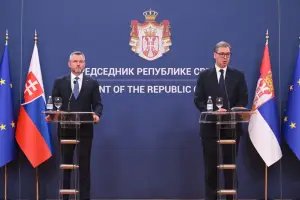 Belgrade, 21 December 2025
Belgrade, 21 December 2025Strengthening cooperation with Slovakia in many areas
-
 Belgrade, 21 December 2025
Belgrade, 21 December 2025President of Slovakia ceremonially welcomed in front of Palace of Serbia
-
 Belgrade, 18 December 2025
Belgrade, 18 December 2025Vučić welcomes President of Georgia in front of Palace of Serbia
-
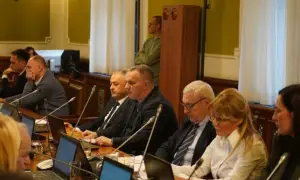 Belgrade, 15 December 2025
Belgrade, 15 December 2025Serbia needs strong, stable education system
-
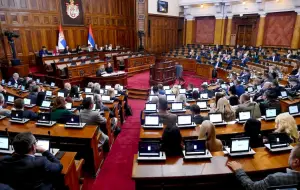 Belgrade, 3 December 2025
Belgrade, 3 December 2025Parliament adopts 2026 budget
-
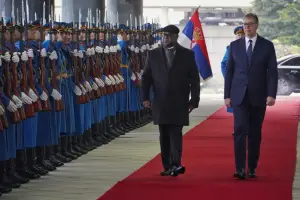 Belgrade, 28 November 2025
Belgrade, 28 November 2025Serbian President welcomes President of DR Congo
-
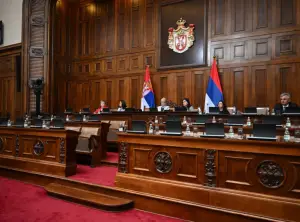 Belgrade, 7 November 2025
Belgrade, 7 November 2025Parliament adopts multiple laws
-
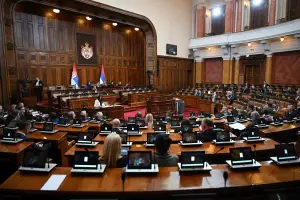 Belgrade, 22 October 2025
Belgrade, 22 October 2025Parliament adopts several laws, ratifies multiple international agreements
-
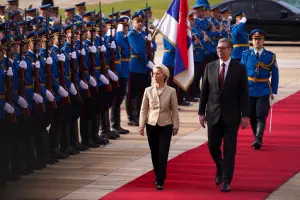 Belgrade, 15 October 2025
Belgrade, 15 October 2025Vučić welcomes Ursula von der Leyen in front of Palace of Serbia
